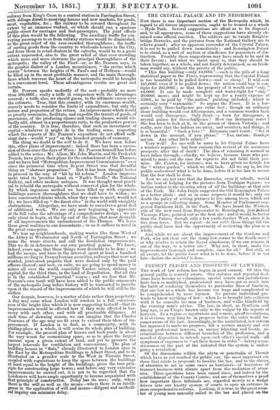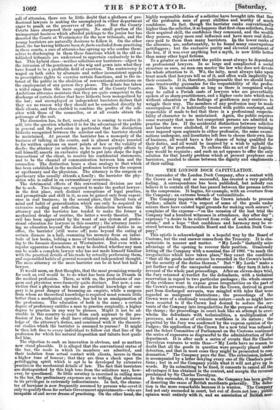PRESENT PLIGHT AND PROSPECTS OF LAWYERS. THE work of law
reform has begun in good earnest. Of this the general public is scarcely aware. Our statutes and reported deci- sions have become so voluminous, special courts and jurisdictions have been so multiplied, professional men have got so much into the habit of confining themselves to particular lines of business, that our law as a whole has become too huge and complicated to be comprehended by mere laymen. No private individual pre- tends to know anything of law : when he is brought into collision with it he consults his man of business, and walks blindfold by the cunning man's advice. The law, in short, as Bentham said long ago, is an Utopia known only to the vulgar by the reports of lawyers. In a region so mysterious and remote, great revolutions, it is obvious, may long be in progress before the outer world be- comes aware of the fact. Accordingly, to the uninitiated, law reform has appeared to make no progress, till a certain anxiety and stir among professional lawyers, an uneasy fidgeting and bustle, re- criminations between different branches of the profession, and a manifest disposition to intrude upon each other's special walk—all symptoms of eagerness to " set their house in order "—betray a con- sciousness on the part of the initiated. that the system is under- going a revolution. Of the discussions within the adyta or penetralia of Themis which have as yet reached the public ear, the most important are those that relate to proposals to localize the bar, and to the claims of attornies to act in some cases as barristers—of barristers tri transact business with clients apart from the mediation of attaa- flies. These questions have been raised since, and indeed by the establishment of the County Courts ; and are of themselves a proof how important those tribunals are, regarded merely as a wedge driven into our knotty system of courts to open an entrance to more comprehensive reforms. Looking, it is true, to the great num- ber of young men annually called to the bar and placed on the roll of attornies, there can be little doubt that a plethora of pro- feseional lawyers is making the unemployed in either department eager to poach on the preserves of the other. But the County Courts have sharpened their appetite. No small portion of the unimportant business which afforded pickings to the junior bar has deserted the Courts at Westminster for the new tribunals, and the young barristers are naturally desirous to follow it. On the other Land, the bar having hitherto been de facto excluded from practising in these courts, a race of attornies has sprung up who confine them- selves to discharging in them those functions which in the old es- tablished tribunals are understood to appertain exclusively to the bar. This hybrid class—neither solicitors nor barristers—object to the intrusion of the gentlemen of the wig and gown into what they have found to be a profitable field of exertion. The controversy is waged -on both sides by alternate and rather inconsistent appeals to prescriptive rights to exercise certain functions, and to the in- terest of the public in the abolition of conventional restrictions on the employment of any person they please. The debate has taken a wider range than the mere organization of the County Courts. Ambitions attornies maintain that they are quite competent to the discharge of certain duties that have hitherto been monopolized by the bar ; and unemployed or independent barristers declare that they see no reason why they should not be consulted directly by their clients, and thus enabled to combine the profits of the soli- citor with those of the counsellor, or at all events obtain the patronage of the suit.
The discussion has, in fact, resolved, or is coming to resolve it- self, into the question whether it is for the advantage of the public in general and the profession in particular that the distinction hitherto recognized between the solicitor and the barrister should be maintained. At present the barrister has a monopoly of the business of talking in the courts, and is almost always resorted to for written opinions on moot points of law or the validity of deeds; the attorney (or solicitor, as he more frequently affects to call himself) asserts an exclusive right to put into shape the legal transactions of the client, to receive his confidential statements, and to be the channel of communication between him and the counsellor. The distinction bears a close analogy to that which has been established in the medical profession between the surgeon or apothecary and the physician. The attorney is the surgeon or apothecary who usually attends a family; the barrister the phy- sician who is called in on extraordinary occasions. The detrimental effects of this conventional division are not far to seek. Two things are required to make the perfect lawyer : in the first place, such distinct conceptions of legal practice, and promptitude and skill in it, as can be gained only from experi- ence in real business; in the second place, that liberal turn of mind and habit of generalization which can only be acquired by extensive reading and reflection. The distinction between the attorney and the barrister has tended to make the former a mechanical drudge of routine, the latter a wordy theorist. The evil has been aggravated by the want of any system of profes- sional education for lawyers in this country ; the attorney receiv- ing no education beyond the discharge of practical duties in an office, the barrister(still worse off) none beyond the eating of certain dinners in a hall, cramming his memory from an infini- tude of law books, bolting a mass of technical details, and listen- ing to the forensic discussions at Westminster. But even with a regular apparatus of teachers, it may be doubted whether any man can be made a complete lawyer who has not made himself familiar with the practical details of his trade by actually performing them, and superadded habits of general research and independent thought. The mere attorney or the mere barrister can be at best but half a lawyer.
It would seem, on first thoughts, that the most promising remedy for such an evil would be to do what has been done in Prussia in the medical profession. There, as with us, the professions of sur- geon and physician were formerly quite distinct. But now, a con- viction that a physician who has no practical knowledge of sur- gery is in great danger of becoming an empiric, while a surgeon from whom no theoretical knowledge is required must remain little better than a mechanical operator, has led to an amalgamation of the professions. The education of both is the same ; a certain degree of proficiency entitles a man to practise surgically, a higher degree to practise in any way be pleases. Might it not be ad- visable in this country to exact from each aspirant to the pro- fession of law, that he shall have attained some practical know- ledge of the Atorney's duties, and combined with it the theoreti- cal studies which the barrister is assumed to pursue P It might be then left free to every individual to follow out that line of the profession for which his natural disposition and talents best quali- fied him.
The objection to such an innovation is obvious, and as matters ROW stand plausible. It is alleged that the conventional status of the bar, the mode in which its members are admitted, and their isolation from actual contact with clients, insure in them a higher tone of honour; that they are thus a check upon the pettifogging spirit which is apt to be developed by extensive practice in the mechanical details of law. The fact that barristers are distinguished by this high tone from the solicitors may how- ever, be questioned. So little scrutiny is exercised in calling men to the bar, the preliminary expenses are so trifling, that admission to its privileges is extremely indiscriminate. In fact, the charac- ter of barrister is now frequently assumed by persons who covet it only to qualify them for certain Government appointments—who are incapable of and never dream of practising. On the other hand, the highly responsible duties of a solicitor have brought into that line of the profession men of great abilities and worthy of much confidence. In fact, though the barrister ranks conventionally higher than the solicitor, it so happens that first-class solicitors, from their acquired skill, the confidence they command, and the wealth they possess, enjoy more real influence and have more real defer- ence paid to them than many barristers. la the lower ranks of the attornies, are, unfortunately, to be found many unscrupulous pettifoggers ; but the exclusive purity and elevated sentiment of the bar, if it was ever anything but a myth, is now little better than many other legal fictions.
To a greater or less extent the public must always be dependent on professional lawyers. In so large and complicated a social structure as ours, no man can master the law who does not devote his whole attention to it. We, the laity, must always take upon trust much that lawyers tell us of it, and often walk implicitly by their counsels. It is, therefore, indispensable that we should have some trustworthy guarantee for the respectability of the profes- sion. This is unattainable so long as there is recognized what may be called a Pariah caste of lawyers who are proverbially spoken of as sharp practitioners, and a higher caste into which men without education or the feelings of gentlemen may contrive to wriggle their way. The members of any profession may be made unscrupulous if it is habitually treated with public contempt, and respectable if made to feel that there is a professional respecta- bility of character to be maintained. Again, the public requires some warranty that none but competent persons are admitted to practise the law. If the accidental distinction between solicitor and barrister were abolished, if the severe preliminary training were imposed upon aspirants to either profession, the same exami- nations undergone, and licentiates left fine to choose their own line of business, all would have a fair chance of being qualified for their duties, and all would be inspired by a wish to uphold the dignity of the profession. To enforce this an act of the Legisla- ture would be requisite; and such an act appears to offer the only solution for that knotty problem 'which at present perplexes our barristers, puzzled to choose between the dignity and empluments of their calling.



























 Previous page
Previous page